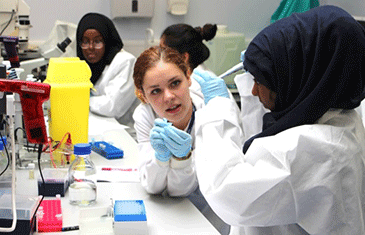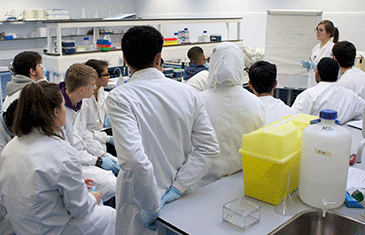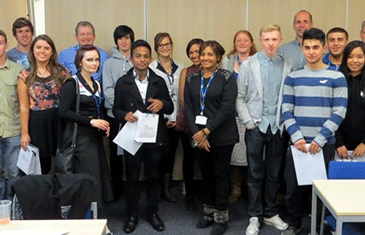BCI STARS, a great way to deliver and to teach science communication

Written by John Marshall, Professor of Tumour Biology at Barts Cancer Institute
In October 2013 twelve school students preparing for their ‘A’ levels were invited to Barts Cancer Institute, part of Queen Mary University of London (QMUL), for a one-week intensive practical course in general research laboratory skills called BCI STARS (Science Training for Aspiring Research Scientists). The success of this has since led to annual courses run in 2014, 2015 and onwards.
In our initial intake we identified twelve year 12 students by working with Access Aspiration, a London-based charity that works with schools with a traditionally low percentage of students progressing to universities or other higher education institutes.
The students were taught in small groups by PhD students in a programme carefully put together with our department’s strengths and facilities in mind. These involved small groups being taught by PhD students to do tissue culture, western blotting, purify and clone DNA from bacteria, run PCRs of their own cheek cell DNA and examine cancer tissues using immunochemistry and microscopy.
In addition, university staff from Widening Participation (WP) came to advise the students on completing their university application form, writing a personal statement and budgeting as a student. The WP team also helped to provide the expertise and training needed by university staff themselves when working with young adults.
These activities are reviewed each year. Thus we collect feedback anonymously from the participating students and use these to monitor and improve the course, as well as to use in applying for further financial support.
I’ve thought research science was boring but after the programme I started to like research science as you get to work on your own projects and be independent.
Anonymous student feedback
BCI facilities enable us to teach 24 students simultaneously in groups of 3-4 supervised by a PhD student. As we’ve found from the school students’ feedback that they prefer having different demonstrators throughout the week we've worked this into the programme, which also gives more opportunities for PhD students to hone their science communication skills by delivering their own segment.

BCI STARS students watching a “Lightning Seminar” from one of the PhD student demonstrators.
The teaching model would allow any university to copy our programme by 3-4 school students following a university student within their lab doing a single technique through the day and the next day following a different student to learn a new technique.
A learning method we’ve developed that proves particularly useful during the course is ‘Lightning Seminar Sessions’, which we do during incubation periods, a period of waiting that could otherwise get boring. Here we give our PhD students a board and a pen and they must teach the students in 5-10 minutes something about their PhD that interests them, with lots of clapping beginning and ending each of the sessions!
Speaking to the PhD students was really useful- they treated me like an equal which helped me gain knowledge and confidence.
Anonymous student feedback

BCI STARS Alumni 2013
Our expectations from BCI STARS 2013, 2014 and 2015 have been far exceeded, both in terms of the positive feedback from our PhD students as well as from the school students (more feedback here). Of the seven 2013 BCI STARS students who provided information on their exam success six got into their first choice course and university. Two are now at medical school, one in veterinary school, one studies physics, two biomedical type degrees and one is training to be a mining engineer.
Recent funding for the course has come from Widening Participation and the Biochemical Society. This year a gift from QMUL Annual Fund will allow us to offer a one day refresher course in year 13 to this years students, prior to their final exams. In addition we will be able to support an administrator to track our STARS this year and subsequent years as they develop toward university; this will enable us to monitor the impact of STARS on the students’ success.
It made me realize that I can go to any university I like and I can do the course that I want to do.
Anonymous student feedback
It is clear that the STARS courses have helped promote both science communication training of PhD students and enhanced the opinions of school students who study science A levels, of what a research scientist is and thus possibly the increased their likelihood of becoming one or pursuing an allied career. Every side wins. The model has even proved so successful that it’s been franchised out to Kings College London, starting their own King’s STARS in 2016!
I hoped to gain more information on research science and also learn one of the basic skills needed to carry out the experiments, and this course has covered every expectation I had before starting.
Anonymous student feedback
Please contact j.f.marshall@qmul.ac.uk for further information or if you wish to obtain an outline of the BCI course and practical handouts that you can adapt. You can also visit the BCI STARS website for more information and images from previous cohorts.
BCI STARS - Advice Summary
| Where to find students | All the students were identified by the charity Access Aspirations a London-based charity that works with schools that traditionally have a low percentage of their students progressing to universities or other higher education institutes. |
| Which year group benefits most | We have determined that year 12 students benefit most. |
| When is the best time of year | Late June/early July, immediately after AS levels, and before the summer break. Avoid a week that includes Eid as it discriminates against some Muslim participants. |
| Teaching materials | It’s best to run your course to suit the strengths and facilities you have in hand. However please contact j.f.marshall@qmul.ac.uk if you wish to obtain an outline of the BCI course and practical handouts that you can adapt. |
| Staff safety training | Your local Widening Participation team will provide the expertise and training you need when working with young adults. |
| Student Numbers | As many as you want and can reasonably cope with. At BCI we can teach 24 students simultaneously. However small groups of 3-4 students could follow a student within their lab and do a single technique. The following day they could swap to a new student and learn a new technique. The school students preferred having different demonstrators each day. |
| “Lightning Seminars” | Lab techniques have incubation periods that sometimes can get boring. Thus during these breaks we give our PhD students a board and a pen and they must teach the students in 5-10’ something about their PhD that interests them. |
| Costs | For BCI STARS we have estimated £75 per person for one full-time week. This includes all lab consumables, stationery, photocopying and some money for snacks and drinks at an ‘Awards Ceremony’. (Note that these costs are for part-boxes and not for full boxes of plastics and kits). |
| Feedback | Use anonymous feedback forms to monitor and improve your course and to apply for financial support. |
Written by John Marshall
Professor of Tumour Biology
Centre for Tumour Biology
Barts Cancer Institute